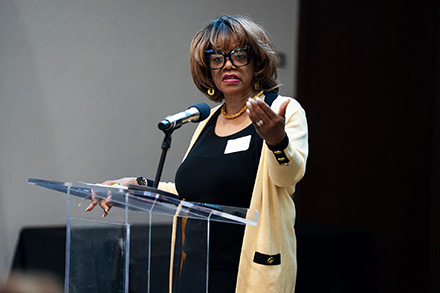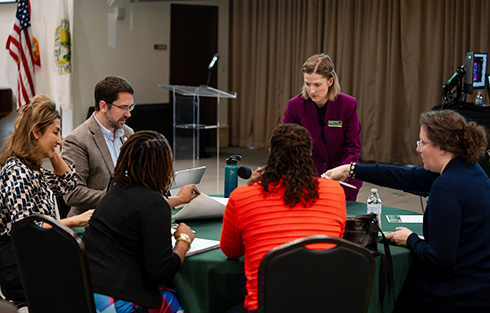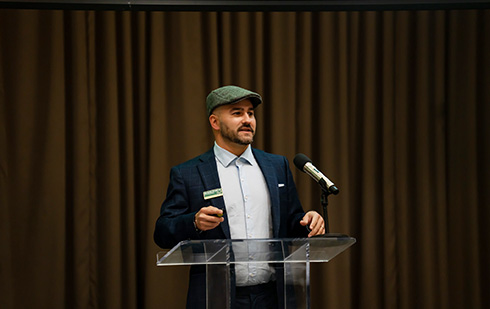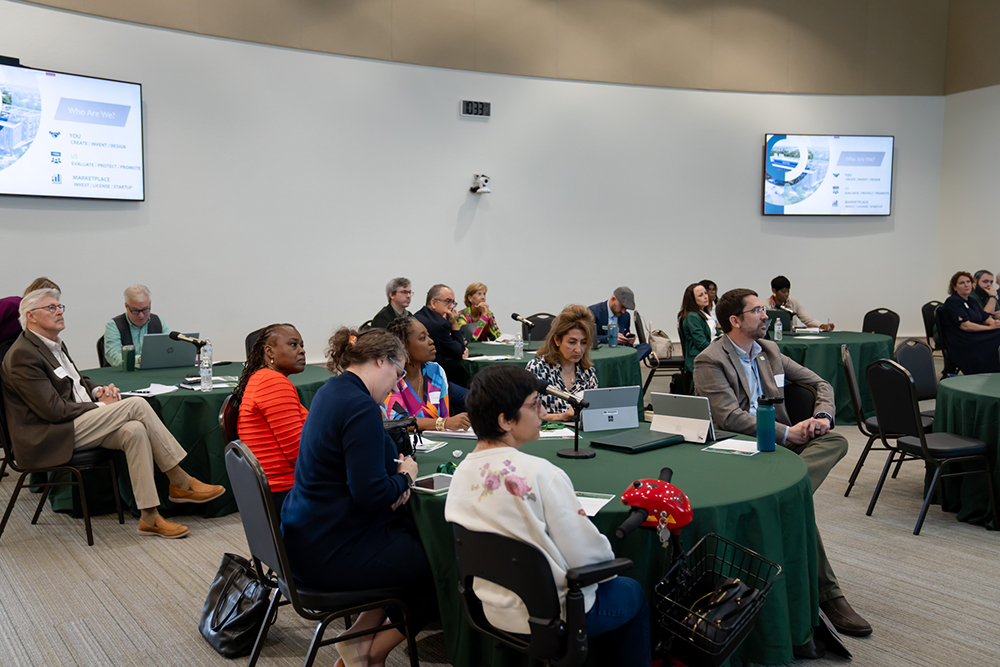By Marc Masferrer, University Communications & Marketing
About 45 faculty members have kicked off a new think tank dedicated to addressing challenges facing education, by fostering new interdisciplinary research and other collaborations across the University of South Florida aimed at delivering new discoveries and solutions.

Florida Center for Partnerships in Arts-Integrated Teaching Director Denise Davis-Cotton addresses the audience.
The required “shifting of paradigms” to properly address those challenges, said Denise Davis-Cotton during the USF Future of Education Think Tank’s opening session at USF Sarasota-Manatee on Jan. 31, is about much more than changing how teachers teach.
“This isn't just another educational forum. It's a convening to shift our thinking on how we prepare humans to thrive in an uncertain future,” said Davis-Cotton, director of the Florida Center for Partnerships in Arts-Integrated Teaching at USF Sarasota-Manatee and one of the three faculty champions for the think tank. “We're here because the future of education isn't just about what we teach, it's about who we become. In a world where knowledge doubles every 12 hours, memorizing facts has become obsolete, but we're learning how to learn, create and collaborate.
“Our presence here today signals our recognition that we must fundamentally re-imagine how we shift the paradigm, not just for our teaching methods, but for the very purpose of education itself,” Davis-Cotton said.
The USF Future of Education Think Tank is part of an organic, faculty-driven effort to bring together dynamic, interdisciplinary teams to address key areas of emphasis, said Miranda Mattingly, associate director of the USF Research Development Institute.

Research Development Institute Associate Director Miranda Mattingly distributes information packets to participants at the Future of Education Think Tank.
“Elevating interdisciplinary research collaborations is essential to USF’s bold goal of reaching $1 billion in research awards by 2030 and work at the RDI,” Mattingly said. “Think Tanks serve as catalysts for collaborations and innovation, mobilizing interdisciplinary teams around complex, global challenges and accelerating their pathway to breakthrough discoveries, competitive funding and sustainable public-private partnerships.”
Other USF think tanks are addressing health and technology, the future of food, artificial intelligence and cybersecurity, oceanographic data and the social determinants of health.
“Our goal is to create spaces where people can not only collaborate with and across One USF,” Mattingly said, “but also be nimble in our ability to form research collaborations that are responsive to emerging areas of transdisciplinary studies and learning environments being rapidly changed by technology.”
USF Future of Education Think Tank participants joined in person at Selby Auditorium and online, with representation from nine USF colleges, including the College of Education, the College of Arts and Sciences, Muma College of Business, the College of Behavioral and Community Sciences, the College of Design, Arts and Performance, the Morsani College of Medicine, the College of Pharmacy, the College of Public Health and the College of Engineering, as well as other centers, institutes and parts of USF.
The challenges facing education, said Dane Minnick, an assistant professor of social work at USF Sarasota-Manatee who specializes in substance abuse and addictions, need to be addressed by all faculty members, not just those who prepare students for future careers as teachers.

Dane Minnick serves as the Eveyln Duvall Endowed Chair of Family Development for the School of Social Work.
“For all of us that are faculty members in here, if you don't list education research as one of your primary research interests, we're making mistakes, which brings us to our first issue, the scholarship of teaching and learning,” said Minnick, the holder of the Evelyn Duvall Endowed Chair of Family Development for the School of Social Work. “What we're really talking about, when we're in a discussion about the scholarship of teaching and learning, is rigorous evaluation of what your outcomes are, and more importantly, the learning process.”
Minnick, who joined the USF Sarasota-Manatee faculty last fall, encouraged his colleagues to integrate experiential learning opportunities into their classes, as a way to adapt to the changing nature in what is expected from them.
"When we are in the classroom, that provides an unbelievable opportunity to engage in activities and learning processes that you cannot get over a computer screen. We need to take advantage and leverage those opportunities to provide something that is both engaging for the students, that really delves into some of these critical concepts, but that also can provide public good,” Minnick said.
Think tank participants also heard of already existing efforts at USF that could serve as models for how the think tank effort progresses. For example, Sarasota-Manatee cybersecurity Professor Giti Javidi of the Muma College of Business, made a pitch for her Applied Research Collaborative, a lab where interdisciplinary research teams and industry partners can use artificial intelligence and other tools to address pressing needs.
In addition to “lightning” presentations from Minnick, Javidi and others, the think tank’s first meeting included smaller breakout sessions where participants took a deeper dive into the paradigms that shape the work of educators across disciplines and reported back to the full meeting about topics they believe need to be addressed as part of the think tank’s work.
Key takeaways highlighted in the group discussions included the need for intentionality and strategic planning in education; the importance of experiential learning and varied learning sites outside the traditional classroom; the challenges of balancing technology and direct engagement between educators and students; and artificial intelligence’s paradigm-shifting impact on education.
The day’s events concluded with the think tank’s faculty champions – Davis-Cotton, as well as Robert Hooker from the Muma College of Business and Bo Pei of the College of Education – urging USF to be a thought leader in the future of education, energizing stakeholders from across disciplines and expertise to forge pathways for the change they want to see.
The Future of Education Think Tank’s next meeting will be at the USF College of Education on the Tampa campus from 1 to 3 p.m. Feb. 13, with remote participation available. Participants are encouraged to register or visit the Research Development Institute’s website for more information about the USF Future of Education Think Tank.
